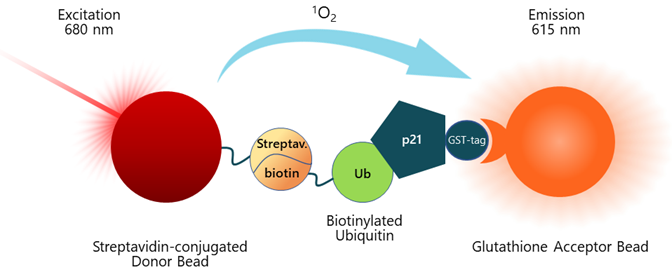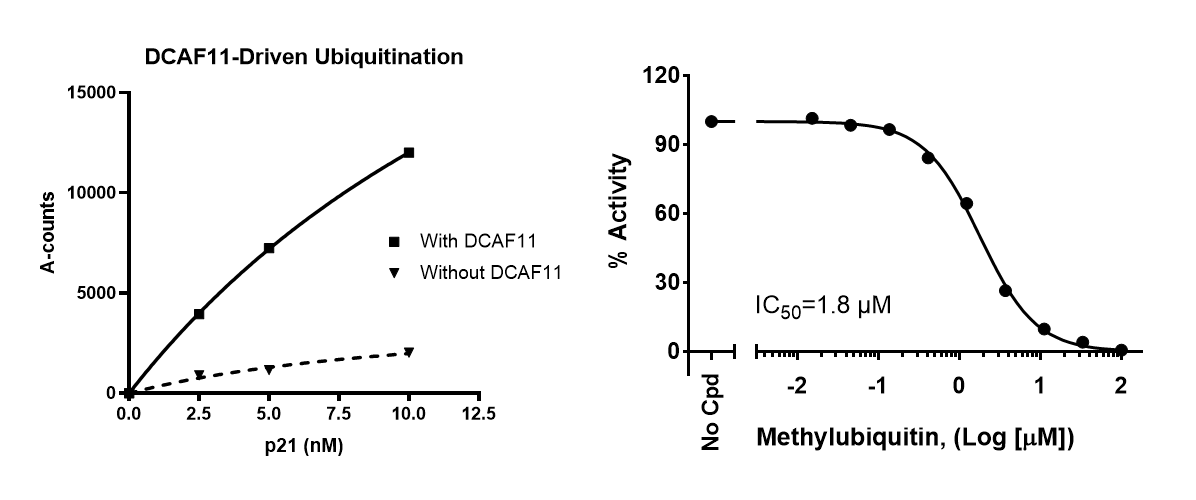Dcaf11-Driven p21 Ubiquitination Assay Kit
The Dcaf11-driven p21 ubiquitination assay kit is a sensitive AlphaLisa® high-throughput screening (HTS) assay kit, designed to measure Dcaf11 (DDB1- and Cul4-associated factor 11) E3 ligase activity in a homogeneous 384 reaction format. The assay kit comes with enough biotinylated ubiquitin, ATP, GST-tagged p21, assay buffer, detection buffer, purified UBE1 (E1), UbcH5b (E2), and Rbx1/Cul4B/Dcaf11/Ddb1 complex (E3) for 384 reactions. The assay detects mono-ubiquitination and poly-ubiquitination of p21.

Figure 1. Dcaf11-driven p21 ubiquitination assay kit schematic.
First, E1 and E2 enzymes are incubated with the E3 complex and with the target protein p21 (GST-tag) in the presence of biotin-conjugated ubiquitin and ATP. Ubiquitination of p21 occurs in a multistep ubiquitin transfer from E1 to E2 to E3, and E3-mediated conjugation of ubiquitin to p21. Next, glutathione-acceptor beads are added, followed by streptavidin-conjugated donor beads, and Alpha-counts are measured. The increase in Alpha-counts is proportional to the mono- or poly-ubiquitination of the GST-tagged p21.
Need us to run inhibitor screens or profile your compounds against Dcaf11-Driven p21? Check out our Ubiquitination Screening Services.
- AlphaLISA® glutathione acceptor beads (Perkin Elmer #AL109C)
- AlphaScreen® Streptavidin-conjugated donor beads (Perkin Elmer #6760002S)
- Optiplate-384 (Perkin Elmer #6007290)
- AlphaScreen® microplate reader
- DNAse free water
| Catalog # | Name | Amount | Storage |
| 80301 | UBE1 (UBA1), Flag-Tag Recombinant* | 25 µg | -80°C |
| 80314 | UbcH5b, His-Tag (Human) Recombinant* | 50 µg | -80°C |
| 101495 | Rbx/Cul4B/Dcaf11/Ddb1 Complex* | 5 µg | -80°C |
| 101584 | p21, GST-Tag* | 5 µg | -80°C |
| Biotin-Ubiquitin | 400 µl | -80°C | |
| ATP (10 mM) | 400 µl | -80°C | |
| U2 Assay Buffer | 2 x 10 ml | -80°C | |
| 4x U2 Detection Buffer | 2 x 2 ml | -20°C |
*The initial concentration of enzyme is lot-specific and will be indicated on the tube containing the protein.
Covalent conjugation to ubiquitin (Ub) is one of the major post-translational modifications regulating protein stability, function, and localization. Ubiquitination is the concerted action of three enzymes: a Ub-activating enzyme (E1), a Ub-conjugating enzyme (E2), and a Ub ligase (E3). The specificity and efficiency of ubiquitination are largely determined by the E3 enzyme, which directs the last step of the Ub-conjugating cascade by binding to both an E2∼Ub conjugate and a substrate protein. This step ensures the transfer of Ub from E2∼Ub to the substrate, leading to its mono- or poly-ubiquitination.
DDB1 and CUL4-associated Factor 11 (Dcaf11, also known as WD Repeat Domain 23, WDR23) is a protein that associates with Cul4A or Cul4B to form a complex with E3 ligase activity. Dcaf11 E3 ligase can ubiquitinate a variety of substrates, including p21 (cyclin-dependent kinase inhibitor 1 or CDK-interacting protein 1). P21 is involved in cell cycle regulation by inhibiting CDK (cyclin-dependent kinase) and PCNA (proliferating cell nuclear antigen). It also mediates p53 response to DNA damage, and its levels have been linked to lymph node metastasis and overall survival rate to cancer. Knocking down any component of the Dcaf11 complex attenuates the ubiquitination level of p21, inhibiting osteosarcoma cell proliferation. The use of drugs targeting the Dcaf complex may be a viable cancer therapy approach.


